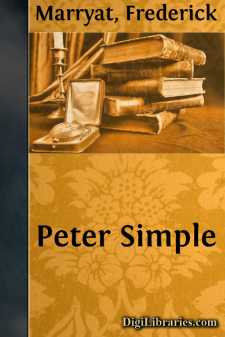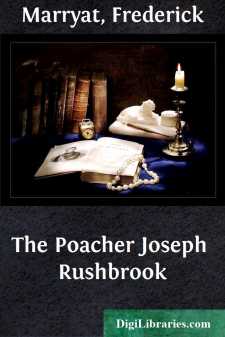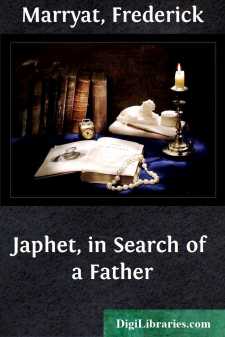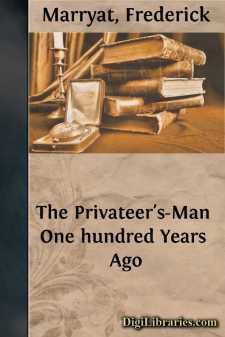Categories
- Antiques & Collectibles 13
- Architecture 36
- Art 48
- Bibles 22
- Biography & Autobiography 815
- Body, Mind & Spirit 144
- Business & Economics 28
- Children's Books 18
- Children's Fiction 14
- Computers 4
- Cooking 94
- Crafts & Hobbies 4
- Drama 346
- Education 58
- Family & Relationships 59
- Fiction 11835
- Games 19
- Gardening 17
- Health & Fitness 34
- History 1378
- House & Home 1
- Humor 147
- Juvenile Fiction 1873
- Juvenile Nonfiction 202
- Language Arts & Disciplines 89
- Law 16
- Literary Collections 686
- Literary Criticism 179
- Mathematics 13
- Medical 41
- Music 40
- Nature 180
- Non-Classifiable 1768
- Performing Arts 7
- Periodicals 1453
- Philosophy 65
- Photography 2
- Poetry 896
- Political Science 203
- Psychology 44
- Reference 154
- Religion 515
- Science 126
- Self-Help 85
- Social Science 83
- Sports & Recreation 34
- Study Aids 3
- Technology & Engineering 60
- Transportation 23
- Travel 463
- True Crime 29
Frederick Marryat
Frederick Marryat (1792-1848) was a British Royal Navy officer and novelist, best known for his sea adventure novels. He is considered a pioneer of nautical fiction, influencing later authors like Joseph Conrad and Herman Melville. His notable works include "Mr Midshipman Easy" and "The Children of the New Forest," which vividly depict naval life and adventures during the Napoleonic Wars.
Author's Books:
Sort by:
The great advantage of being the fool of the family—My destiny is decided, and I am consigned to a stockbroker as part of his Majesty’s sea-stock—Unfortunately for me Mr Handycock is a bear, and I get very little dinner. If I cannot narrate a life of adventurous and daring exploits, fortunately I have no heavy crimes to confess: and, if I do not rise in the estimation of the reader for acts of...
more...
In which there is more Ale than Argument. It was on a blusterous windy night in the early part of November, 1812, that three men were on the high road near to the little village of Grassford, in the south of Devonshire. The moon was nearly at the full, but the wild scud, and occasionally the more opaque clouds, passed over in such rapid succession, that it was rarely, and but for a moment or two, that...
more...
Chapter I Every one acquainted with the manners and customs of the East must be aware, that there is no situation of eminence more unstable, or more dangerous to its possessor, than that of a pacha. Nothing, perhaps, affords us more convincing proof of the risk which men will incur, to obtain a temporary authority over their fellow-creatures, than the avidity with which this office is accepted from the...
more...
Introduction of Divers Parties and a Red-Herring. It was in the month of January, 1699, that a one-masted vessel, with black sides, was running along the coast near Beachy Head, at the rate of about five miles per hour. The wind was from the northward and blew keenly, the vessel was under easy sail, and the water was smooth. It was now broad daylight, and the sun rose clear of clouds and vapour; but he...
more...
However boldly their warm blood was spilt,Their life was shame, their epitaph was guilt;And this they knew and felt, at least the one,The leader of the hand he had undone—Who, born for better things, had madly setHis life upon a cast, which linger’d yet. Byron. There is perhaps no event in the annals of our history which excited more alarm at the time of its occurrence, or has since been the...
more...
CHAPTER I Which the reader will find very easy to read. Mr Nicodemus Easy was a gentleman who lived down in Hampshire; he was a married man, and in very easy circumstances. Most couples find it very easy to have a family, but not always quite so easy to maintain them. Mr Easy was not at all uneasy on the latter score, as he had no children; but he was anxious to have them, as most people covet what...
more...
Chapter I Like most other children, who should be my godfather is decided by Mammon—So precocious as to make some noise in the world and be hung a few days after I was born—Cut down in time and produce a scene of bloodshed—My early propensities fully developed by the choice of my profession Those who may be pleased to honour these pages with a perusal, will not be detained with a long...
more...
Chapter One. The Revolution of 1830, which deprived Charles the Tenth of the throne of France, like all other great and sudden changes, proved the ruin of many individuals, more especially of many ancient families who were attached to the Court, and who would not desert the exiled monarch in his adversity. Among the few who were permitted to share his fortunes was my father, a noble gentleman of...
more...
CHAPTER I. We cruise off Hispaniola—Capture a French Ship—Continue our Cruise—Make a Nocturnal Attack upon a Rich Planter’s Dwelling—Are repulsed with Loss. To Mistress ——. Respected Madam, In compliance with your request I shall now transcribe from the journal of my younger days some portions of my adventurous life. When I wrote, I painted the feelings of my heart without reserve, and I...
more...
Chapter I These are the errors, and these are the fruits of misspending our prime youth at the schools and universities, as we do, either in learning mere words, or such things chiefly as were better unlearned.—MILTON. My father was a gentleman, and a man of considerable property. In my infancy and childhood I was weak and sickly, but the favourite of my parents beyond all my brothers and sisters,...
more...











